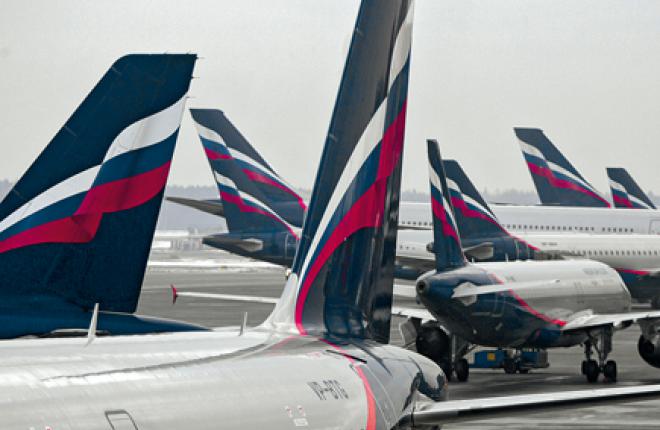Hitting rock bottom

It appears that the demand for air services in Russia hit rock bottom in February this year. Every time spring comes and the travel segment revitalizes, the two-digit plummeting of passenger traffic tends to stop. Not this time, however: Russian carriers will have to get used to low demand, and to seek new markets, if they want to reduce their dependence on macroeconomic fluctuations in Russia.
Russian airlines’ passenger numbers dropped by 4% in February, and passenger kilometers flown by 12%; for international flights operated to destinations outside the CIS area, the decline was 22% and 24%, respectively. Domestic passenger traffic grew by 7% (and passenger kilometers, by under 5%), but this figure included services to and from Crimea, which had been classed as international flights until April last year. Without the Crimean statistics, the Russian domestic air services market saw nearly zero growth in February, compared to more than 10% in December and January.
Services to CIS countries demonstrated an impressive 11% growth, despite the Ukrainian crisis and the fact that Crimea was no longer regarded as part of the CIS. Liberalization of air services with Armenia and Moldova contributed significantly to this figure: Russian airlines currently perform 83 one-way weekly flights from Moscow to Yerevan, and 39 to Chisinau, meaning much higher frequencies than one year ago. The crisis-related demand for flights to Central Asia is also an important factor as temporary workers head home.
The January and February decline in passenger numbers on routes to destinations outside the CIS (by 19% and 22% respectively) turned out to be greater than expected. It appears that certain psychological factors were at work here, such as the crisis-related cutting of household expenses, which normally include travel. Despite the March recovery of the ruble exchange rate (by 5% to the dollar and by 10% to the euro), there will be no radical changes to the continuing decline of the market: the price elasticity of demand is taking the back seat to two microfinancial factors – households saving for a rainy day and households prioritizing their basic needs. We should not forget about the decline in business travel demand, which is related to the curtailing of foreign economic activity. Statistically, until August or September this year, the latter factor will continue to affect passenger numbers.
Therefore, unless something extraordinary happens, like the ruble’s rebound to the pre-crisis exchange rates and/or the lifting of Western sanctions, demand for flights to destinations outside the CIS may drop 10-15% by midfall. Traffic to CIS destinations is likely to keep growing, but this segment accounts for just 10% in Russian airlines’ statistics, so does not influence the bottom line all that much.
The feeble growth on domestic routes indicates that no expected reorientation of tourist flows from foreign to domestic destinations has materialized. On the other hand, February is historically the slowest month for domestic tourism in Russia (totally in contrast with tourism to foreign destinations), for the only exception of skiing resorts, and demand will certainly start growing from May. There are, however, two significant negative factors that will be impeding this growth: the aforementioned redistribution of household expenditures, with increasingly little money being allocated for travel and leisure, and the upcoming hike in air fares. Air ticket prices for domestic flights stayed indecently low in February, and carriers reported 25–30% losses. We expect air fares to grow considerably more expensive by the beginning of the high season. Since price elasticity cannot just be ignored, the latter factor will be limiting consumer activity growth to 5–6%.
Это закрытый материал портала ATO.RU.
Полный текст материала доступен только по платной подписке.
Вопросы, связанные с платным доступом, направляйте на адрес paywall@ato.ru
Для пенсионеров у нас 50% скидка на все виды доступа. Зарегистрируйтесь на сайте под своим реальным ФИО (например, Иван Иванович Ивванов), указав, что Вы пенсионер, и отправьте с емэйла, который указали при регистрации скан/фотографию подтверждающего документа по адресу jkabardina@ato.ru.
Услуга "Автоплатеж". За двое суток до окончания вашей подписки, с вашей банковской карты автоматически спишется оплата подписки на следующий период, но мы предупредим вас об этом заранее отдельным письмом. Отказаться от этой услуги можно в любое время в личном кабинете на вкладке Подписка. Подробные условия автоматической пролонгации подписки.
Я подписчик / Я активировал промокод.
Если у вас есть неактивированный промокод, авторизуйтесь/зарегистрируйтесь на сайте и введите его в своем Личном кабинете на вкладке Подписка
Ссылки по теме
- Для того, чтобы оставить комментарий, не привязанный к социальной сети, войдите или зарегистрируйтесь на нашем сайте.
CIS & Russian Aviation News And Insights
- Aeroflot to add 23 new destinations to its vast summer route network
- Sky Gates Airlines takes delivery of second Ilyushin IL-96-400T
- Superjet 100 flies with Russian engines
- Aeroflot posts first full year profit since pandemic
- Supporting Russia’s fleet of Western-built aircraft is a humanitarian necessity – AmCham Russia
- Rosaviatsiya: Russian airlines’ passenger traffic to decline in 2025
- Aeroflot promotes initiative towards harmonization of Russia’s continued airworthiness system with international standards
- Russia’s Smartavia passenger traffic decreased by 6.7%
- Russian airlines 2024 traffic exceeds the pre-sanctions level









